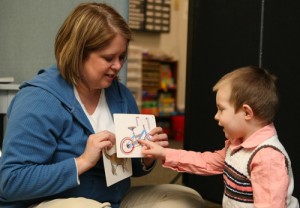After your child was diagnosed with a speech disorder, you may have felt lost for a little while, but eventually you formulated a plan of attack. You probably read everything you could find on his specific speech disorder and talked to a few experts. Then, you had to make a choice between public or private speech therapy.
Public speech therapy refers to speech therapy that is administered by a speech-language pathologist (SLP) working in the school. Private speech therapy means that the SLP has her own practice or she works in a hospital or clinic. There is also a third option. You might live near a university with a speech clinic. You could enroll your child in speech therapy lessons with graduate students who are supervised by licensed SLPs. There are benefits and drawbacks to all three of these options and in the end, it really boils down to what’s best for your child and your family. Weigh the pros and cons carefully before making a decision.







